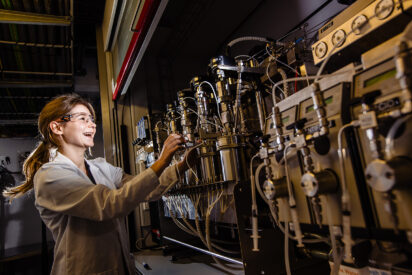ICO2NIC project transforms industrial CO2 waste into versatile feedstock using Innovative electrochemical CO2 conversion
With €14 million in funding from the European Union, the ICO2NIC project will drive the development of Carbon Capture and Utilisation (CCU) technologies by transforming industrial CO2 waste into valuable resources, advancing economic sustainability and helping to achieve EU climate targets.
Launched in January 2025, the ICO2NIC strategy will promote CO2 capture and electrochemical conversion to transform industrial CO2 waste into valuable feedstock. The project aims to capture and valorise waste CO2, making CCU economically viable, and paving the way to substantially reduce global emissions. Through ICO2NIC’s CO2 capture and conversion technologies, the project will be able to produce high-value goods and materials, creating opportunities for long-term CO2 capture in Europe.
Key aspects the project will focus on include:
- Capturing and electrochemically converting CO2 into formic acid.
- Using renewable energy and innovative technologies to reduce CO2 emissions and energy consumption.
- Producing high-value goods and materials while supporting decarbonisation efforts in the EU refinery sector.
CLICK here to read the full PRESS RELEASE
ACTIVITIES of the Bio Base Europe Pilot Plant
Scale-up of the microbial oil production.
Scale-up of microbial protein production
PARTNERS
The ICO2NIC consortium is led by SINTEF and will establish a comprehensive value chain, from the CO2 emitter, on-site demonstrator and executor (TUPRAS) to the end consumers (TUPRAS and Procter & Gamble). The process consists of carbon collection and purification (Cool Planet Technologies), electrochemical conversion to formic acid (Avantium), followed by bioconversion and up-grading (b.fab and NoPalm Ingredients), and the scaling up the fermentation process (BBEPP) to microbial oils. These oils and their chemical derivatives will be evaluated by Procter & Gamble and TUPRAS as a feedstock for the Hydrotreated Esters and Fatty Acids (HEFA) process in Sustainable Aviation Fuel (SAF) production. This industrial model could provide a viable economic framework for all stakeholders, even without external financial support, and will be validated through the project’s implementation.
By integrating renewable energy systems with digital monitoring and control technologies (Idener), leading Research and Technology Organisations will validate the concept’s cost-effectiveness, environmental performance, and scalability through the development of a strong Technical and Economic Assessment and process design (SINTEF) and Life Cycle Assessment (TNO). The communication and dissemination of ICO2NIC will be led by the European association CO2 Value Europe, ensuring that the project’s findings reach a wide audience and contribute to global efforts in sustainable industrial innovation.
SUPPORTED by
The ICO2NIC project has received funding from the European Commission under the Horizon Europe program Ref: 101177459.




 webdesign
webdesign